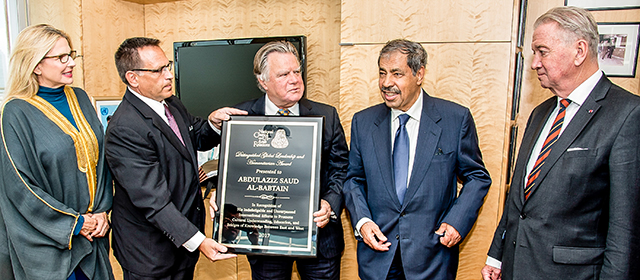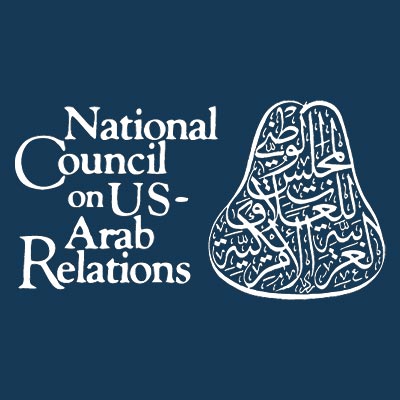Washington, DC: On September 7, 2017, at the International Peace Institute (IPI) in New York City, the National Council on U.S.-Arab Relations (National Council) was honored and privileged to present its Distinguished Global Leadership and Humanitarian Award to Mr. Abdulaziz Saud Al-Babtain. The Award was conveyed in recognition of his indefatigable and extraordinary international efforts to promote cultural understanding, education, and bridges of knowledge between East and West.

Dr. Anthony noted that Mr. Al-Babtain started out as a representative of Kuwait’s Ministry of Education, where, beginning in 1956, he worked for five years before the country obtained its full independence. He then switched fields to become an entrepreneur, rising over time to become one of the most prominent and successful business leaders not only in Kuwait and the GCC region but the Arab world as a whole.
Simultaneous to his commercial pursuits, Mr. Al-Babtain became increasingly engaged in charitable and humanitarian work, contributing to worthy causes in numerous sectors of Kuwaiti society. In addition to sponsoring Kuwait’s first library of Arabic poetry, regarded as the world’s finest, he also was the driving force behind the establishment at Kuwait University of its Center for The Gulf & Arabian Peninsula Studies, headed by renowned Kuwaiti scholar, editor, and writer Dr. Mohammed Al-Rumaihi. Last November, when Dr. Anthony was in Kuwait for elections for the country’s parliament, its National Assembly (Majlis An-Nuwab), a nephew of Mr. Al-Babtain, Abdalwahab Al-Babtain, won one of the seats. He, too, was present in New York for the award presented to his uncle.
Mr. Al-Babtain has made important contributions to global wellbeing through his tireless support of educational and cultural initiatives, and especially through the medium of rhyme and verse in Arabic, designed to touch and affect the heart and soul. Given the numerous educational centers and institutions that he has established and sponsored, the National Council bestowed upon him its award to recognize publicly and internationally his achievements made in furtherance of humanity’s ceaseless quest for enhanced peace and tolerance.
Beyond being a well-known poet and someone who has long encouraged poets and poetry, Mr. Al-Babtain is widely recognized also as one of the most prominent philanthropic leaders of Kuwait’s highly successful corporate community. His commercial and industrial acumen and activities span Europe, the United States, China, and the Middle East. He published his first collection of poems, “Intimations of the Desert,” in 1995, and his second collection, “Wastefarer,” in 2004. He has been awarded numerous honorary Arab and foreign doctorate degrees as well as medals of honor.
Of special importance is a volume dedicated to matters pertaining to peace that Mr. Al-Babtain had published earlier this year. Titled “Contemplations for Peace,” it is available from the Abdulaziz Saud Al-Babtain Cultural Foundation in Kuwait. Former Maltese Foreign Minister Michael Frendo, in a Foreword to the book, writes that, “This gem of a book … is a heartfelt cry for all of humankind to embrace peace as a value, as a goal, as a way of life.”
Dr. Anthony agrees, saying “what is particularly remarkable about this brief and easily readable work is not so much its succinctness, its clarity of thought, and its straightforward expression, impressive as all three of those traits are. More to the heart of what Mr. Al-Babtain has to say and share are the observations of human behavior that he has gained from his long, diverse, and productive life.
“The value of what Mr. Al-Babtain has chosen to present to readers,” Dr. Anthony observed, “lies in the distillation of what he has gleaned from a close analysis of philosophical tenets and the historical examples of extraordinary leaders of conscience, conviction, and courage. It is, above all, his offering of insights, knowledge, and understanding of and experiences in the different societies, countries, and belief systems that he has visited and studied in virtually every corner of inhabited earth.
“It is his insistent call,” Dr. Anthony concluded, “for the planet’s peoples to rise above what he refers to as ‘the hate ideologies that have spurred racism and sectarian-religious conflict.’ Strongly reinforcing Mr. Al-Babtain’s and humankind’s ceaseless quest for peace are the book’s two parts: ‘The Seven Rules for Peace’ coupled to the ‘Seven Ways to Achieve Peace.’ Underscoring his message is the serenity that comes from peace in terms of what can be accomplished for the betterment of society, in the enhancement of one’s life, and through enrichment of the lives of one’s fellow human beings.”
Information about Mr. Al-Babtain and his charitable endeavors can be found at www.albabtainprize.org.

